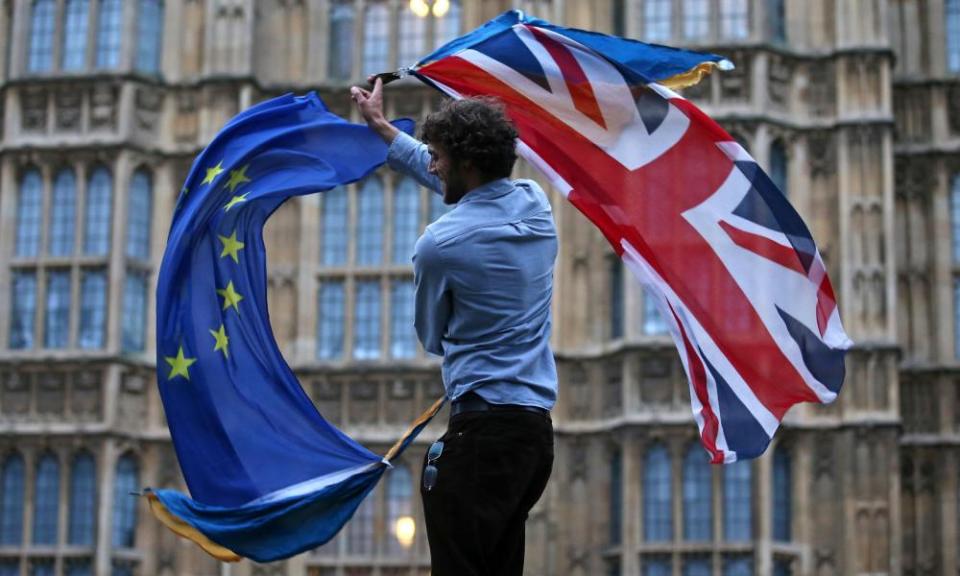As the Brexit vote turns one, leaving has never been more uncertain | Dan Roberts

One year on from Britain’s vote to leave the EU, the anniversary of the referendum was overshadowed by fresh outbreaks of doubt.
In Brussels, Theresa May’s farewell offer on EU citizenship was met with a shrug from commission president Jean-Claude Juncker and a chorus of voices urging Britain to stay. In Westminster, her own chancellor, Philip Hammond, is one of many dusting down alternative models of Brexit to soften its impact on a faltering economy. British officials in Whitehall have meanwhile had had to temper their negotiating strategy after May’s mandate to walk away with no deal was undermined by a humiliating general election result.
But what are the chances of Brexit 2.0 emerging from a second year of Britain’s post-referendum soul-searching? Has an election in which both main parties still supported departure simply flushed out the last few remoaners in denial? Or was this the week the wheels started to fall off May’s all-or-nothing exit vehicle?
For scholars with a long view, some messiness is to be expected. In a speech to mark the referendum anniversary, historian Peter Hennessy warned the country was attempting its “greatest geopolitical shift in the world since the winding up of Britain’s territorial empire”. Rather than taking place over decades, the rules allowed just two years for a “great unbundling of 46 years of accumulated legislation and regulation acquired over what future historians will now see as our aberrational stretch as part of an integrating European community”.
The false certainty of the referendum result is, he argued, inevitably being replaced with the fuzzy reality of a still divided country. “The recent general election was our means of absorbing the outcome of our 2016 eruption of plebiscitory democracy into the promiscuous, free-flowing mainstream of our system of representative democracy,” Prof Hennessy told the British Academy.
Just how free-flowing the British constitution can be likely to become more apparent as a minority government attempts to steer through parliament the eight giant pieces of Brexit legislation announced in this week’s Queen’s speech. Brexiteers fear opponents will seek to sabotage the process by ignoring constitutional niceties such as the Salisbury convention, which in theory discourages the House of Lords from obstructing anything explicitly promised in a government’s election manifesto.
Critics of Brexit, meanwhile, are hoping the government will uphold another unwritten rule known as the Sewell convention – which requires the assent of Scottish, Welsh and Northern Irish assemblies in matters that affect their devolved powers. Since losing a high court challenge on article 50, the Edinburgh parliament is unlikely to wield a veto over Brexit entirely, but it could yet chose to frustrate the process of leaving the single market.
During the Queen’s speech debate, the prime minister conceded that her Brexit legislation may require just such a legislative consent motion (LCM). Any attempt to wriggle out will be further ammunition for critics who say her proposed Brexit legislation is already an abuse of crown prerogative rarely attempted since the English civil war.
“By any standards, some of the Brexit legislation would normally require LCMs,” said Sir David Edward, a former judge on the European court of justice and an expert on Scottish law. “But you never know what the intelligentsia of the Tory party may deem to be within their exclusive competences. After all, they want power to amend primary legislation by executive order. Charles I is not dead yet!”
For European optimists, the recent general election points not just towards a revival of parliamentary sovereignty but the possibility of counter-revolution.
The EU council president, Donald Tusk, was pressed to explain his decision to quote from John Lennon’s Imagine when asked if Brexit might be reversed. “Politics without dreams would be a nightmare … miracles do happen,” insisted the former Polish prime minister. “The best part of politics is that everything is possible.”
But other observers are in a less forgiving mood, especially after a week, one thinktank said, in which “like an embarrassing drunk at a party, the UK lurche[d] towards the exit”.
“The Brits do not have a single negotiator of stature in their ranks,” added the Süddeutsche Zeitung’s London correspondent Christian Zaschke. “If it weren’t so serious, the situation in Great Britain would almost be comical.” Der Spiegel even claimed that “following the most recent election, Brexit is defunct”.
In other circumstances, such talk could be put down to sour grapes on the continent, but in the bars of Westminster, anonymous voices are also beginning to contemplate the unthinkable.
“This country is fucked,” a senior Tory reportedly told Politico. “We are tethered to the mast of Brexit and when it goes wrong we’re screwed. They all know it. All Labour have to do is hedge their bets. When the public realise they have been sold a pup they will turn on the party.”
And philosopher Alain De Botton was told to expect further climbdown. It could, he said, see the country stay in the European Economic Area in exchange for reform, not revolution, on the vexed question of free movement of people. “Cabinet minister tells me Conservatives ready to accept EEA with 5 year immigration brake. Will be offered after German elections,” he tweeted.
The problem – as both Brexiters and remainers unite in pointing out – is that once you start contemplating the need for a transition that is both half in and half out of Europe, the arguments in favour of staying put quickly mount. The lengthy transition phase desired by Hammond and others would retain many of the economic benefits of EU membership but with even less of the political freedoms said to motivate voters than the country enjoys now.
The path from hard Brexit to soft Brexit could become a slippery slope to no Brexit.

 Yahoo News
Yahoo News 